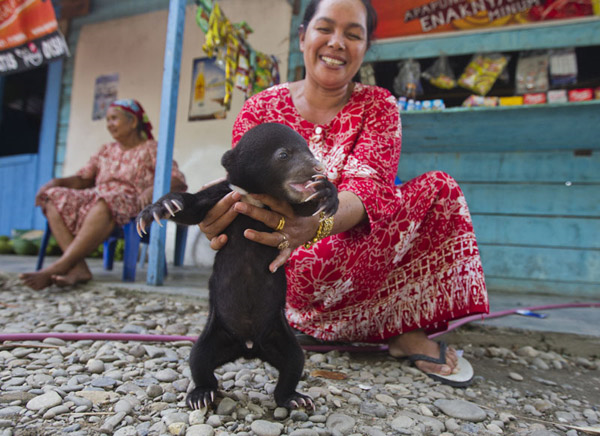Illegal wildlife trade flourishes in Sumatra – Critically endangered orangutans sell for $200 – ‘It’s a zoo, but you can buy’
By Birchard Kellogg
10 June 2013 (mongabay.com) – In a chilly rain on Sunday, in a town just a few kilometers beyond the edge of a protected Sumatran rainforest, a young orangutan sat perched on a piece of plywood and grabbed the metal wires of his tiny cage. He has sat in that cage for six months and, like more than a dozen other species on display in this “zoo” in the town of Kandang in Aceh, he has a price tag. This packed assembly is an acknowledged front for illegal trafficking in wildlife. “It’s a zoo, but you can buy,” said the wife of the property’s owner. The critically endangered orangutan? $200. A leopard cat? $25-$50. A steady rotation is evident. In March, a staff member of a Sumatran conservation organization working to fight the trade witnessed a critically endangered baby sun bear on the property. About a week later, two other bears sat caged, according to the same eyewitness. None are there now. Primates appear to be frequently traded, or simply die from lack of care. Eight months ago, three other orangutans were caged here, witnesses said, along with a gibbon that has since died. One orangutan has disappeared, likely sold. When a flood hit on May 10, locals say one escaped and another drowned.
Trade in threatened species is illegal in Indonesia, but prosecutions are rare, conservation organizations here say. As forests are increasingly cut down for plantations and mining concessions in Aceh, trafficking in wildlife is growing. According to the the Sumatran Orangutan Quarantine Centre, of 143 orangutans confiscated in the province, not a single case has been prosecuted. In a vegetable market high in nearby hills, a bird dealer approached by this reporter listed a menu of protected species that poachers could procure with two-weeks’ notice. This included protected hornbills, orangutans and golden gibbons, the last going for $100. On this property in Kandang, endangered species have been openly caged for about three years. But its owner, Limbat, is a wealthy man widely seen by locals as untouchable. On Sunday, some 15 other species taken from the surrounding rainforest were on display, packed tightly in cages or tethered to trees. Near the orangutan, four pigtailed macaques sat in a two-foot by six-foot cage just high enough for them to crouch but not stand. A ditch littered with trash lay below it. Nearby, two other macaques were tethered to trees, a green cord wrapped around one’s neck.
A baby macaque lurked nearby, hiding under a tarp. Above it, concealed under a coverlet, was a tiny slow loris, listed as vulnerable in Sumatra. Ten feet away, two black binturong sniffed this visitor’s hand, while a pangolin lay curled nearby in a tight ball. In yet another cage, a large Sumatran tree squirrel paced franticly back and forth, its brown and white furry tail extended behind it. [more]

